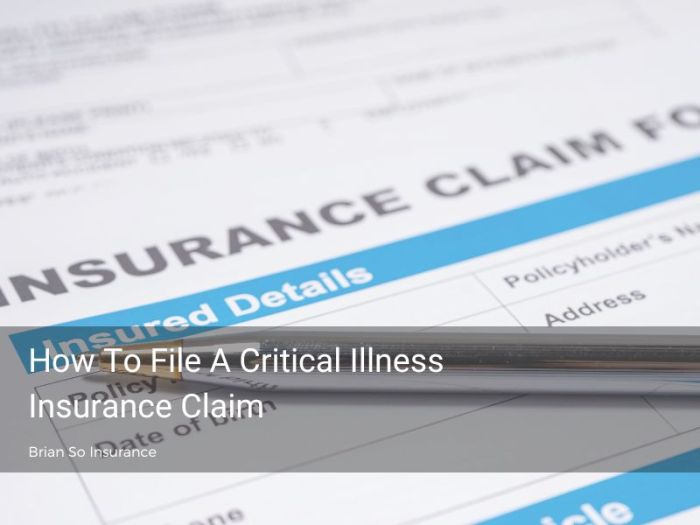Receiving a denial for your critical illness insurance claim can be devastating, especially when you’re facing a serious health crisis. Understanding the reasons for denial and knowing how to appeal the decision is crucial. This comprehensive guide Artikels the steps you should take if your critical illness insurance claim is denied in 2025, providing you with the information and strategies needed to navigate this challenging situation.
Understanding Critical Illness Insurance Claim Denials
Critical illness insurance is designed to provide a lump-sum payment upon diagnosis of a specified critical illness, such as cancer, heart attack, or stroke. However, insurance companies have specific criteria and conditions that must be met for a claim to be approved. Denials often stem from issues related to:
Common Reasons for Denial:
- Pre-existing conditions: If your critical illness was diagnosed or showed symptoms before the policy’s effective date or during a waiting period, the claim may be denied. This is a common reason for denial, so carefully review your policy’s definition of “pre-existing condition”.
- Policy exclusions: Your policy may exclude certain illnesses, treatments, or circumstances. Review your policy documents carefully to understand what is and isn’t covered.
- Incomplete or inaccurate application: Providing false or misleading information on your application can lead to claim denial. Insurance companies thoroughly investigate applications to ensure accuracy.
- Failure to meet the policy’s definition of a critical illness: The policy will specify the precise diagnostic criteria for each covered illness. Your diagnosis might not perfectly align with the policy’s definition.
- Lack of sufficient medical evidence: The insurer may require specific medical documentation, such as doctor’s reports, test results, and hospital records, to support your claim. Insufficient or inadequate evidence can lead to denial.
- Non-compliance with policy terms: Failing to adhere to the policy’s terms and conditions, such as timely notification or required follow-up appointments, can affect your claim.
- Fraudulent claims: Attempts to defraud the insurance company will result in immediate denial and potential legal repercussions.
Steps to Take After a Denial
Receiving a denial letter isn’t the end of the road. Here’s a structured approach to follow:

Source: briansoinsurance.com
1. Review the Denial Letter Carefully
Understand the specific reasons cited for the denial. Note any missing documentation or inconsistencies highlighted by the insurer. This is your starting point for building your appeal.
2. Gather Supporting Documentation
Compile all relevant medical records, doctor’s notes, test results, and any other documentation that supports your claim. The more comprehensive your evidence, the stronger your appeal will be. Consider obtaining a second opinion from a specialist if necessary.

Source: sharelawyers.com
3. Contact Your Insurance Provider
Reach out to your insurance company’s claims department to discuss the denial. Ask clarifying questions about the reasons for the denial and inquire about the appeals process. Keep detailed records of all communications.
4. Understand Your Policy’s Appeals Process
Your policy will Artikel the specific steps involved in appealing a claim denial. Follow these procedures meticulously, adhering to deadlines and submitting all required documentation. Failure to follow the proper channels could jeopardize your appeal.
5. Prepare a Formal Appeal
Write a formal appeal letter addressing each point of the denial letter. Provide clear and concise explanations, supported by your gathered documentation. Maintain a professional and respectful tone throughout the letter.
6. Consider Legal Assistance
If your appeal is unsuccessful, you may wish to seek legal counsel. An attorney specializing in insurance law can review your case, advise on your options, and represent you in further negotiations or litigation if necessary.
7. Explore Alternative Dispute Resolution (ADR)
ADR methods, such as mediation or arbitration, can provide an alternative path to resolving disputes outside of court. These methods can be faster and less costly than litigation.
Frequently Asked Questions (FAQs)
- Q: How long does the appeals process typically take?
A: The timeframe varies depending on the insurer and the complexity of the case. It can range from several weeks to several months. - Q: What if my appeal is denied again?
A: If your second appeal is denied, you may consider legal action or exploring alternative dispute resolution methods. - Q: Are there time limits for appealing a claim denial?
A: Yes, there are usually strict deadlines for filing an appeal. Refer to your policy documents or contact your insurer to confirm these deadlines. - Q: Can I get help with the appeals process?
A: Yes, you can seek assistance from consumer protection agencies, legal aid organizations, or an insurance attorney. - Q: What information should I include in my appeal letter?
A: Include your policy number, the date of the denial letter, a clear explanation of why you disagree with the denial, and supporting medical documentation. - Q: What if my critical illness isn’t explicitly listed in my policy?
A: Carefully review your policy wording for similar conditions or clauses that might cover your illness. If nothing applies, you may have limited recourse.
s:
Critical illness insurance claim denial, insurance claim appeal, denied insurance claim, critical illness insurance, insurance claim process, health insurance claim, appeals process, insurance denial letter, medical insurance claim, pre-existing conditions insurance, insurance policy exclusions, medical evidence insurance claim, insurance fraud, alternative dispute resolution, insurance lawyer, 2025 insurance claims.
Resources:
For further information, consult your policy documents or contact your insurance provider. You may also find helpful resources from consumer protection agencies and legal aid organizations in your area.
Call to Action:
Don’t let a denied claim discourage you. Take proactive steps to understand your rights, gather supporting evidence, and follow the proper appeals process. If you need assistance, seek professional help from an insurance attorney or consumer advocate. Your health and financial well-being are paramount.
Question & Answer Hub
What if my doctor’s diagnosis differs from the insurance company’s assessment?
Obtain a second medical opinion and thoroughly document all medical evidence supporting your claim. This additional evidence can strengthen your appeal.
Can I get help with the appeals process?
Yes, consider consulting with a healthcare advocate or an attorney specializing in insurance law. They can provide guidance and support throughout the process.
What if the insurance company requests additional information?
Respond promptly and completely to all requests. Failure to provide necessary information can weaken your appeal.
What are the time limits for appealing a denied claim?
Your policy will specify deadlines for appealing a denial. Adhere strictly to these timelines.
What if my appeal is unsuccessful?
You may have the option to pursue further action, such as filing a complaint with your state’s insurance commissioner or seeking legal counsel.
